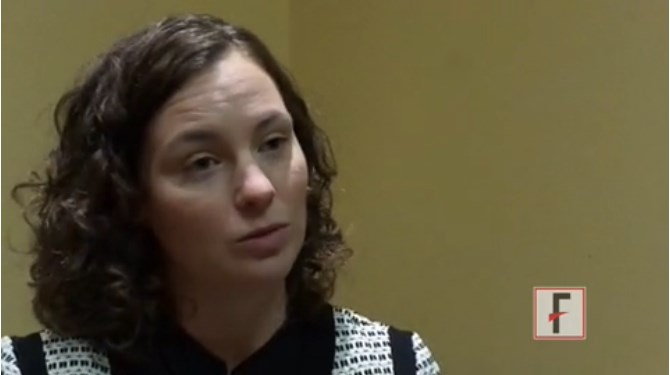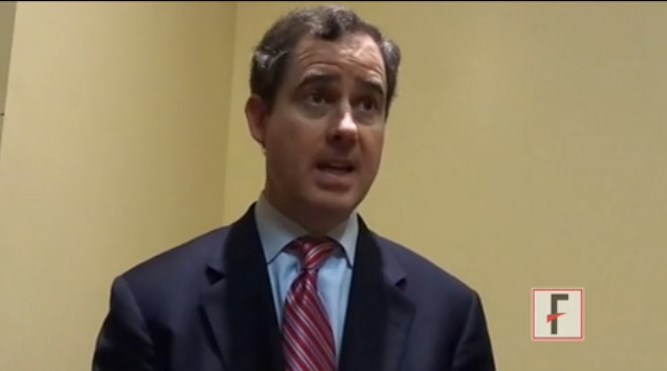User login
Pain Care for Primary Care
VIDEO: Consistency is key to monitoring patients on opioids
ORLANDO – Take a consistent approach with all patients on opioid therapy, regardless of a patient’s perceived potential for abuse, Dr. Melissa B. Weimer advised.
“This is an area of medicine where I feel we need to apply universal precautions to all patients,” noted Dr. Weimer, assistant professor of medicine, Oregon Health and Science University, Portland. “We’re treating all patients as at some level of potential harm from this medication.”
In an interview at a meeting held by the American Pain Society and Global Academy for Medical Education, Dr. Weimer outlined a strategy that employs the same protocol to monitor therapy, even when the abuse potential is considered to be low.
Global Academy and this news organization are owned by the same company. Dr. Weimer reported no financial disclosures.
The video associated with this article is no longer available on this site. Please view all of our videos on the MDedge YouTube channel
ORLANDO – Take a consistent approach with all patients on opioid therapy, regardless of a patient’s perceived potential for abuse, Dr. Melissa B. Weimer advised.
“This is an area of medicine where I feel we need to apply universal precautions to all patients,” noted Dr. Weimer, assistant professor of medicine, Oregon Health and Science University, Portland. “We’re treating all patients as at some level of potential harm from this medication.”
In an interview at a meeting held by the American Pain Society and Global Academy for Medical Education, Dr. Weimer outlined a strategy that employs the same protocol to monitor therapy, even when the abuse potential is considered to be low.
Global Academy and this news organization are owned by the same company. Dr. Weimer reported no financial disclosures.
The video associated with this article is no longer available on this site. Please view all of our videos on the MDedge YouTube channel
ORLANDO – Take a consistent approach with all patients on opioid therapy, regardless of a patient’s perceived potential for abuse, Dr. Melissa B. Weimer advised.
“This is an area of medicine where I feel we need to apply universal precautions to all patients,” noted Dr. Weimer, assistant professor of medicine, Oregon Health and Science University, Portland. “We’re treating all patients as at some level of potential harm from this medication.”
In an interview at a meeting held by the American Pain Society and Global Academy for Medical Education, Dr. Weimer outlined a strategy that employs the same protocol to monitor therapy, even when the abuse potential is considered to be low.
Global Academy and this news organization are owned by the same company. Dr. Weimer reported no financial disclosures.
The video associated with this article is no longer available on this site. Please view all of our videos on the MDedge YouTube channel
EXPERT ANALYSIS FROM PAIN CARE FOR PRIMARY CARE
VIDEO: Use fiduciary duty to set pain medication boundaries
ORLANDO – Physicians should use the concept of fiduciary duty to set appropriate boundaries with patients taking pain medications, explained Dr. Louis Kuritzky.
Often, patients want treatments that are not in their best interests, noted Dr. Kuritzky of the department of community health and family medicine at the University of Florida, Gainesville.
In an interview at a meeting held by the American Pain Society and Global Academy for Medical Education, Dr. Kuritzky outlined how physicians can take a fiduciary duty approach to set boundaries with patients in a dispassionate manner.
Global Academy and this news organization are owned by the same company. Dr. Kuritzky reported a financial relationship with Lilly.
The video associated with this article is no longer available on this site. Please view all of our videos on the MDedge YouTube channel
ORLANDO – Physicians should use the concept of fiduciary duty to set appropriate boundaries with patients taking pain medications, explained Dr. Louis Kuritzky.
Often, patients want treatments that are not in their best interests, noted Dr. Kuritzky of the department of community health and family medicine at the University of Florida, Gainesville.
In an interview at a meeting held by the American Pain Society and Global Academy for Medical Education, Dr. Kuritzky outlined how physicians can take a fiduciary duty approach to set boundaries with patients in a dispassionate manner.
Global Academy and this news organization are owned by the same company. Dr. Kuritzky reported a financial relationship with Lilly.
The video associated with this article is no longer available on this site. Please view all of our videos on the MDedge YouTube channel
ORLANDO – Physicians should use the concept of fiduciary duty to set appropriate boundaries with patients taking pain medications, explained Dr. Louis Kuritzky.
Often, patients want treatments that are not in their best interests, noted Dr. Kuritzky of the department of community health and family medicine at the University of Florida, Gainesville.
In an interview at a meeting held by the American Pain Society and Global Academy for Medical Education, Dr. Kuritzky outlined how physicians can take a fiduciary duty approach to set boundaries with patients in a dispassionate manner.
Global Academy and this news organization are owned by the same company. Dr. Kuritzky reported a financial relationship with Lilly.
The video associated with this article is no longer available on this site. Please view all of our videos on the MDedge YouTube channel
EXPERT ANALYSIS FROM PAIN CARE FOR PRIMARY CARE
VIDEO: Primary care is pain care’s front line
ORLANDO – Primary care physicians need to be on the front line of pain care, explained Dr. Paul J. Christo.
The most important reason is the sheer volume of individuals with chronic pain, according to Dr. Christo, associate professor of anesthesiology at Johns Hopkins University, Baltimore.
In an interview at a meeting held by the American Pain Society and Global Academy for Medical Education, Dr. Christo discussed the trends driving pain cases into primary care offices and how primary care physicians can manage those cases in a busy practice.
Dr. Christo reported financial relationships with Algiatry, Egalet, Golin Harris, Purdue, Rahm, and Trevena. Global Academy and this news organization are owned the same company.
The video associated with this article is no longer available on this site. Please view all of our videos on the MDedge YouTube channel
ORLANDO – Primary care physicians need to be on the front line of pain care, explained Dr. Paul J. Christo.
The most important reason is the sheer volume of individuals with chronic pain, according to Dr. Christo, associate professor of anesthesiology at Johns Hopkins University, Baltimore.
In an interview at a meeting held by the American Pain Society and Global Academy for Medical Education, Dr. Christo discussed the trends driving pain cases into primary care offices and how primary care physicians can manage those cases in a busy practice.
Dr. Christo reported financial relationships with Algiatry, Egalet, Golin Harris, Purdue, Rahm, and Trevena. Global Academy and this news organization are owned the same company.
The video associated with this article is no longer available on this site. Please view all of our videos on the MDedge YouTube channel
ORLANDO – Primary care physicians need to be on the front line of pain care, explained Dr. Paul J. Christo.
The most important reason is the sheer volume of individuals with chronic pain, according to Dr. Christo, associate professor of anesthesiology at Johns Hopkins University, Baltimore.
In an interview at a meeting held by the American Pain Society and Global Academy for Medical Education, Dr. Christo discussed the trends driving pain cases into primary care offices and how primary care physicians can manage those cases in a busy practice.
Dr. Christo reported financial relationships with Algiatry, Egalet, Golin Harris, Purdue, Rahm, and Trevena. Global Academy and this news organization are owned the same company.
The video associated with this article is no longer available on this site. Please view all of our videos on the MDedge YouTube channel
EXPERT ANALYSIS FROM PAIN CARE FOR PRIMARY CARE
VIDEO: Tailor chronic pain interventions to patient’s clinical profile
ORLANDO – Address chronic pain with multiple modalities individualized by patient clinical profile, said Dr. Charles E. Argoff, professor of neurology and director of the Comprehensive Pain Center at Albany (N.Y.) Medical Center, in a video interview.
The neuroplastic changes that take place in the nervous system following a lesion or injury may respond in an aberrant manner in some patients, triggering chronic pain, and the clinician’s job is to find the right mix of interventions – pharmacologic, behavioral, and/or surgical – that best matches the patient’s clinical profile, he said at the meeting held by the American Pain Society and Global Academy for Medical Education. Global Academy and this news organization are owned by the same company.
Dr. Argoff reported financial relationships with Allergan, AstraZeneca, Depomed, Eli Lilly, Endo Pharmaceuticals, Forest Laboratories, Millennium Laboratories, Nektar Therapeutics, Pfizer, Xenoport, and Zogenix.
The video associated with this article is no longer available on this site. Please view all of our videos on the MDedge YouTube channel
ORLANDO – Address chronic pain with multiple modalities individualized by patient clinical profile, said Dr. Charles E. Argoff, professor of neurology and director of the Comprehensive Pain Center at Albany (N.Y.) Medical Center, in a video interview.
The neuroplastic changes that take place in the nervous system following a lesion or injury may respond in an aberrant manner in some patients, triggering chronic pain, and the clinician’s job is to find the right mix of interventions – pharmacologic, behavioral, and/or surgical – that best matches the patient’s clinical profile, he said at the meeting held by the American Pain Society and Global Academy for Medical Education. Global Academy and this news organization are owned by the same company.
Dr. Argoff reported financial relationships with Allergan, AstraZeneca, Depomed, Eli Lilly, Endo Pharmaceuticals, Forest Laboratories, Millennium Laboratories, Nektar Therapeutics, Pfizer, Xenoport, and Zogenix.
The video associated with this article is no longer available on this site. Please view all of our videos on the MDedge YouTube channel
ORLANDO – Address chronic pain with multiple modalities individualized by patient clinical profile, said Dr. Charles E. Argoff, professor of neurology and director of the Comprehensive Pain Center at Albany (N.Y.) Medical Center, in a video interview.
The neuroplastic changes that take place in the nervous system following a lesion or injury may respond in an aberrant manner in some patients, triggering chronic pain, and the clinician’s job is to find the right mix of interventions – pharmacologic, behavioral, and/or surgical – that best matches the patient’s clinical profile, he said at the meeting held by the American Pain Society and Global Academy for Medical Education. Global Academy and this news organization are owned by the same company.
Dr. Argoff reported financial relationships with Allergan, AstraZeneca, Depomed, Eli Lilly, Endo Pharmaceuticals, Forest Laboratories, Millennium Laboratories, Nektar Therapeutics, Pfizer, Xenoport, and Zogenix.
The video associated with this article is no longer available on this site. Please view all of our videos on the MDedge YouTube channel
EXPERT ANALYSIS FROM PAIN CARE FOR PRIMARY CARE


